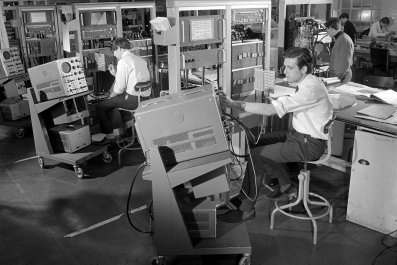At age 6, Rebecca's body began to develop in ways that seemed unusual. Her mother, Ellen, had noticed a change in Rebecca's breast area, but some of the other little girls, the chubbier ones at least, also seemed to be carrying extra weight there. But there was also the hair that had begun to appear under her daughter's arms.
"People assumed she was so much older than she was, but still she would cry sometimes, and people would look at you like, How old is that kid?" says Ellen, who spoke to Newsweek under condition of anonymity.
When a test showed Rebecca's bone age to be 10½, a pediatric endocrinologist diagnosed "precocious puberty." While the exact cause is unknown, this endocrine disorder is triggered by the early release of hormones in the brain, a circumstance that hurls a child into sexual maturation years before the usual age.
This sudden sexual development in a child so young can be unnerving to parents. "My daughter is 7 years and 10 months old. She started having body odor at 5 and breast buds at 6," one mother wrote recently in a group chat about the condition. She wrote, too, of her daughter's "roller-coaster emotions," a common complaint from parents observing massive mood swings, PMS-like symptoms and other "teen emotions" in daughters just beginning the first grade—and in some cases even younger.
The condition affects individuals in different ways. According to Ellen , the most troubling sign in Rebecca was growing six inches in one year. "There was a lot of stress mainly due to her height," says Ellen. "People would say, 'Oh, she's so tall!,' not thinking or anything, and you could see her little face get sad."
"People thought I was older," says Rebecca, who is now 14. "[Like] I had failed kindergarten or something." Her mother says, "She had to be very mature a lot of the time, but on the flip side, she was all into Disney and still a little girl."
Unlike Rebecca, many precocious kids lose their interest in Disney and little-girl things and begin to act, well, the age of their bodies. The mother of one 8-year-old wrote that her daughter "is a very sexual being. Although she does not by definition understand what 'sexiness' means, she exhibits a very particular awareness of her body and wants other people to notice her." Another mother observed, "It is really as if my 6-year-old has a 12-year-old trapped in her body."
Living in a Sea of Chemicals
In girls, puberty is commonly defined as breast development, growth of pubic hair and menarche, the beginning of the menstrual cycle. At the turn of the 20th century, the average age for an American girl to get her period was 16 to 17. Today, that number has plummeted to less than 13, according to data from the National Health and Nutrition Examination Survey. The trend has been attributed to the epidemic of overweight children and a greater exposure to pollution, which does bad things to developing bodies and accelerates the timing of a girl's first menstruation.
Environmental toxins also cause many girls to develop breasts at an earlier age than in the past. Compared with 20 years ago, American girls today begin developing breasts anywhere from one month to four months earlier, a significant difference. At the same time, the number of girls who begin to develop early is increasing. "Just a generation ago, less than five percent of girls started puberty before the age of 8; today that percentage has more than doubled," note Dr. Louise Greenspan and Dr. Julianna Deardorff in The New Puberty: How to Navigate Early Development in Today's Girls.
Among the toxins causing this trend, the biggest offenders are plastic compounds, in particular phthalates, man-made chemicals found all over the place: in plastic food and beverage containers, carpeting, shampoos, insect repellents, vinyl flooring, shower curtains, plastic toys and in the steering wheels and dashboards of most cars. Our bodies cannot metabolize phthalates, which interfere with the endocrine system—the body's system of glands and hormones—and harm fat cells. Indirectly, phthalates may cause weight gain and so influence the timing of puberty. "The No. 1 factor that was pushing girls into puberty early was their body mass index," says Dr. Frank Biro, director of education and a professor in the Division of Adolescent Medicine at Cincinnati Children's Hospital Medical Center.
Our children are living in a "sea of chemicals," says Dr. Marcia E. Herman-Giddens, a professor of public health at the University of North Carolina. She argues that children are speeding into puberty before they're ready, and that this early maturation is both the symptom of bodily damage that has already occurred and the probable cause of health consequences they may expect in the future.
Getting Hit On
"It's one of the most robust findings in studies of psychological development," says Dr. Laurence Steinberg, a professor of psychology at Temple University, and author of Age of Opportunity: Lessons From the New Science of Adolescence. He is referring to recent research demonstrating how earlier-maturing girls are more likely to become depressed. One 2014 study, for instance, finds "girls with earlier [puberty] timing had higher levels of depression symptoms at age 10 years." Another study echoes these findings, while also suggesting such effects may be long-lasting. Along with higher rates of depression, younger girls who enter puberty earlier than their peers are more prone to obesity and drug abuse.
When children enter puberty, their brains undergo changes—brought on by the flood of pubertal hormones—that "makes them especially attentive to what other people think of them and especially responsive to social reward," says Steinberg.
Dopamine, a neurotransmitter crucial to the experience of pleasure, floods and effectively remodels the pathway between the behavior-regulating prefrontal cortex and the brain's reward center. "The adolescent brain is one where the accelerator is pressed to the floor before there's a good braking system in place," says Steinberg. "This gap between when the brain is easily aroused and when the braking is in place creates a period of vulnerability." With puberty occurring at a younger age, this period begins earlier, when a girl may be inadequately prepared.
After all, early maturing girls naturally attract unwanted attention. "You encounter a young lady in the mall and she looks like she's 15 years old," says Biro. "You will interact with her like she's 15, but suppose she's 11?" And because of the way her brain is being flooded with hormones, a young girl hanging out with older kids most likely wants to please and may be more inclined to go along with the crowd.
Meanwhile, no matter how physically developed a girl is, her psychosocial maturation remains anchored to her chronological age. "These young girls get, let's use the term "hit on," by older boys and men and how can they be prepared to deal with it? Obviously, grown women have a hard [enough] time dealing with unwanted sexual attention," observes Herman-Giddens.
The brain is highly plastic, and stressful experiences like these take their toll. Early-maturing girls are more likely to smoke cigarettes, they are at high risk for substance use, and they have higher rates of eating disorders. Though most of this fallout is experienced while they are young, some of the consequences extend into adult life. Substance problems and depression experienced at a young age can easily return, for instance. Then there are health problems that those who undergo early puberty are more likely than the general population to experience later on in their lives, like higher blood pressure and cardiovascular problems.
"Puberty is considered one of those windows of susceptibility," says Biro, when the body is especially sensitive to the negative health impact of social and environmental stressors. In particular, the actively maturing breast tissue of a girl, unlike the breast tissue of a full-grown woman, is more vulnerable to damaging environmental pollutants.
Today's girl is both starting puberty earlier and going through it more slowly, according to Biro, which means a girl remains in this high-risk state for a longer amount of time. In an article he co-authored with Deardorff and others, Biro found up to a 30 percent increased risk for breast cancer when a woman experiences her first period at a younger age. And "for each year that age of menarche was delayed, the risk of premenopausal breast cancer was reduced by 9 percent, and risk of postmenopausal breast cancer was reduced by 4 percent."
Early breast development also opens the door to reproductive tract cancers, says Herman-Giddens, since "if you're starting to develop breasts, your body is making estrogen." Estrogen, especially when combined with stress hormones, is a known cancer-causing agent. Having had an earlier start to puberty, an early-maturing girl produces more estrogen over the years and so elevates her lifetime risk of reproductive cancers.
Able to Conceive in Kindergarten
There is a medical solution for patients who, like 6-year-old Rebecca, are diagnosed with precocious puberty. Hormone treatments can essentially halt the process of sexual maturation. Then, at an appropriate age, the drugs are withdrawn and puberty plays out.
Some girls diagnosed with precocious puberty have no choice but to medicate in order to prevent serious bone and growth problems. Rebecca fell into this category. While precocious children may stand half a foot taller than their peers in kindergarten, these same children also tend to stop growing at a young age and so never reach their predicted adult heights. Often, they fail to reach five feet tall.
As the average age of the onset of puberty continues to rapidly decrease, the line between endocrine disorder and so-called normal development has begun to blur. "A lot of girls who we are labeling as premature puberty now are probably normal, healthy girls who are at the lower end of the new normal," says Dr. Paul Kaplowitz of Children's National Medical Center. Which makes it pretty difficult for parents to know whether they should be medicating their young daughters.
In these edge cases, the decision to undergo hormone therapy is a matter of balancing potential benefits and harms. According to Dr. Alan Christianson, author of The Adrenal Reset Diet, the medications themselves may have both short-term side effects, such as headaches, hot flashes and vaginal bleeding, and possible lasting complications, such as thyroid gland disorders.
Another barrier to treatment is the expense: The drugs cost a minimum of $15,000 a year, excluding lab costs. In Ellen's case, most of this was covered by insurance, but she still ended up having to pay a few thousand dollars a year.
Which is why many parents decide there's nothing more to do for an early-maturing daughter other than guiding her, the best they can, through the vulnerable years. That, though, is often a difficult and solitary road to walk. As Ellen says, "Precocious puberty is not like allergies or something where you can just find other mothers on the playground or at the school going through the same thing with their kids."
But many other parents do choose medication. Having seen very young girls struggle with their periods, Kaplowitz says he's "OK" with treating those early-maturing girls who "are likely to start their period well before age 10." More than a few girls today begin breast development shortly after turning 8 and then continue growing at a rapid pace.
Outward manifestations of maturation are one thing. Usually, though, it's not height problems or breast development that propel parents to opt for medical treatment. "In my experience, it is largely because parents are worried about whether their girls can handle periods at an early age," says Kaplowitz.
In the words of one mother in a chat room, the possibility that her daughter "could menstruate at any time (she was already having discharge by about 3 or 4) trumped the height factor.... The mere possibility of her being able to conceive in kindergarten was enough for me to decide to treat her."































